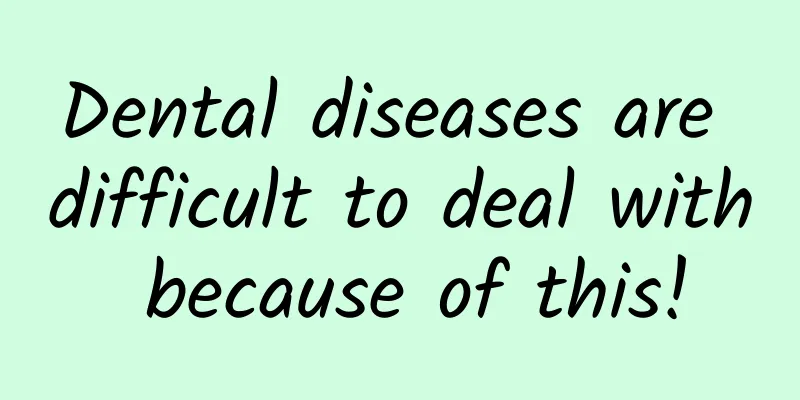Dental diseases are difficult to deal with because of this!

|
In many people's impressions, although dental diseases are generally not fatal, they are often difficult to deal with - they come and go, and they are endless. The essence of this phenomenon is that the occurrence of dental diseases is generally related to the oral environment, and the oral environment seems to be "innate" and often difficult to change. Among them, oral bacteria are a key role. So, how do oral bacteria affect our oral environment? And what can we do? Ordinary oral bacteria, unusual "plaque" Bacteria are an integral part of nature, and the digestive tract, respiratory tract, and urogenital tract of the human body are all home to a large number of bacteria, so it is not uncommon for bacteria to be found in the mouth. But to be precise, it is dental plaque, not oral bacteria, that is related to the occurrence of oral diseases. Dental plaque is a magical existence in the oral cavity. Although it originates from oral bacteria and is essentially a collection of oral bacteria, it is very different from oral bacteria. Specifically, the characteristics of dental plaque are: ① It is more closely bound to the surface of tissues and organs such as teeth; ② It has a stronger ability to resist antibacterial and bactericidal drugs. This makes dental plaque difficult to remove by rinsing the mouth, and it is also difficult to control with medication. This is probably the reason why dental diseases are more difficult to deal with. Same oral bacteria, different dental outcomes Although everyone has oral bacteria, it is obvious that the health of the oral cavity varies greatly. In terms of common dental conditions, they can be roughly divided into four categories: healthy type, caries type, periodontitis type, caries + periodontitis type. The so-called healthy type is one who has neither cavities nor periodontitis. Obviously, this type of person is rare and belongs to the lucky ones. The last type can be said to be the "unlucky ones". The most common types are caries type and periodontitis type. These two types are mutually exclusive in a sense. The reason is that in caries type, oral bacteria are mainly caries-causing bacteria, while in periodontitis type, oral bacteria are mainly periodontal pathogens. The metabolites of the former are acidic, while the metabolites of the latter are alkaline. Acidic products inhibit the growth of periodontal pathogens, while alkaline products are not conducive to the formation of caries. The above situation is the reason why "people with tooth decay always have tooth decay, and people with periodontitis always have periodontitis", and it is also the fundamental reason why tooth decay and periodontitis often do not exist at the same time. Controlling dental plaque can only rely on "Yugong moving mountains" Since bactericidal and antibacterial drugs are difficult to deal with dental plaque, there is only one ultimate way to control dental plaque, which is mechanical removal, including but not limited to brushing, flossing, and washing teeth. These methods cannot be achieved overnight or once and for all. Therefore, controlling dental plaque can only rely on the patience and perseverance of "Yugong moving mountains". |
>>: Exploring keratitis: Unveiling the mystery of this "contact lens"
Recommend
It is taboo to lie down during menstruation
Menstruation is a special period for women, and t...
What to do if your ankles swell during pregnancy
Pregnancy should be a very happy thing for women,...
Will keeping long hair during pregnancy compete for nutrition for the baby?
gossip "Will long hair compete with the baby...
Will low estradiol slow down the doubling of hcg?
If estradiol is low, it is important to adjust it...
Female has dull pain under left rib
We should pay attention to the phenomenon of dull...
Effects of low hemoglobin on the body of perioperative patients
In clinical work, we often encounter patients wit...
How much does breast biopsy cost?
Breast cancer is a very serious disease, so patie...
Symptoms of female sexual indifference, please see the authoritative answers of experts
The word "sexual apathy" appears more a...
What kind of tea should women drink for internal heat due to Yin deficiency?
The so-called Yin deficiency and fire, in other w...
Pregnant women eating ice cream will affect the fetus
Ice cream is loved by our female friends in daily...
Five ectopic pregnancies
Once an ectopic pregnancy occurs, pregnant mother...
Application of Octreotide PET/CT in Neuroendocrine Tumors
Author: Shi Xue Reviewer: Zhao Yinlong Case 1 The...
What are the postoperative care for breast cancer?
When breast cancer develops to an advanced stage,...
Reasons why your menstrual period has not come yet
Many women have had this problem: their menstrual...









